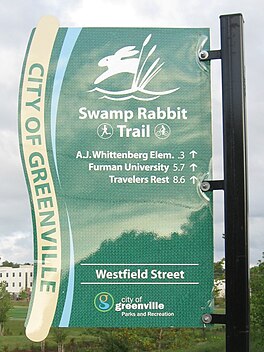Swamp Rabbit Trail
| Swamp Rabbit Trail | |
|---|---|
 Swamp Rabbit Trail | |
| Length | 19.9 mi (32.0 km) |
| Location | Greenville County, South Carolina |
| Use | Cycling, walking, running |
| Difficulty | Easy |
| Season | Year-round |
The Prisma Health Swamp Rabbit Trail is a 19.9-mile (32.0 km)[1] multi-use rail trail in Greenville County, South Carolina, that largely follows the bed of a former railroad that had been nicknamed after the indigenous swamp rabbit.[2] South-to-north the current trail begins at Greenville Technical College, crosses the city of Greenville, proceeds through Falls Park and the campus of Furman University, and ends about a mile north of the Travelers Rest city limits.[3]
History
[edit]In 1999, Greenville County Council created the Greenville County Economic Development Corporation to purchase the roadbed of the defunct Greenville & Northern Railway[4] for dual use as a greenway and light rail passenger line.[5] The proposed commuter rail was quickly abandoned, but The Greenville News editorially suggested a bike and hiking trail, though admitting the plan to be an "unrealistic dream."[6] As late as 2005, the head of a Greenville conservation group hiked the route "armed with a machete" because the proposed trail was "heavily overgrown...almost impassible in parts."[7]
Although planning for a multi-use trail began that summer, the Surface Transportation Board in Washington had to approve the abandonment of the line, and a private Greenville firm suggested buying it and resuming rail service. Eventually the private firm bowed out, and in April 2006, the STB approved the abandonment.[8][9] In 2007, the Greenville Health System gave $1 million towards the $2.7 million project, and the trail was officially named the Greenville Health System Swamp Rabbit Trail.[10] The Swamp Rabbit Trail was already attracting users by January 2008, even before it officially opened in 2010 after considerable "legal entanglements, regulatory roadblocks, financial issues and citizen opposition."[11]
One currently unconnected section runs from Lake Conestee Nature Park to Parkins Mill Road and I-85, and another disconnected section exists in Fountain Inn. Residents of the affluent Parkins Mill neighborhood have opposed a connector from the Lake Conestee section,[12] but Greenville County plans to bridge the gap with underpasses or overpasses.[13]
A 2012 study estimated that more than 350,000 people annually used the trail and that area businesses increased their sales from 30 to 85%.[14] A 2014 study estimated usage had increased to half a million people a year, a quarter of whom were tourists.[15] In 2013, the mayor of Travelers Rest said that the trail had "been phenomenal for the whole county, but more so for us in Travelers Rest. I can't begin to tell you how much of an economic boost it's been to this town."[16] A 2012 Greenville News editorial described the Swamp Rabbit Trail as "one of the most popular assets in Greenville County...proving that when it comes to such trails, if you build them they will come."[17] In 2016, Greenville County Recreation estimated the trail's economic impact on the county to be $7 million per year.[18]
References
[edit]- ^ TrailLink.com
- ^ Mann Batson, The Swamp Rabbit Railroad: Legacy and Legend (Travelers Rest, SC: privately published, 2010).
- ^ Greenville County Recreation District website. The Greenville Health System pledged $1 million and was given naming rights. Rails-to-Trails Conservancy website.
- ^ Abandoned Rails.com — Greenville to River Falls
- ^ Greenville News, April 21, 1999, 1B.
- ^ Greenville News, "Greenway Dream Comes True," April 12, 2017, 2A.
- ^ Mike Foley, "Trek on the tracks," Greenville News, February 8, 2005. Carlton Owen, chairman of Upstate Forever, thought some of the trees growing through the railbed were large enough to be "commercially harvestable.
- ^ Greenville News, November 22, 2006.
- ^ Hallo, Lisa (October 26, 2018). "The trail that almost wasn't". Upstate Forever. Retrieved December 11, 2018.
- ^ Hallo, Lisa (October 26, 2018). "The trail that almost wasn't". Upstate Forever. Retrieved December 11, 2018.
- ^ Greenville County Council Chairman H. G. "Butch" Kirven, quoted in the Greenville Journal, January 18, 2013, 14. Kirven considered the Swamp Rabbit Trail a highlight of his tenure, but called it "a very close thing." Amanda Cove, "Swamp Rabbit Trail aids business boom," Greenville News, September 17, 2016, 1, 4.
- ^ "Parkins Mill residents say 'No,'" Journal Watchdog, July 27, 2011. In 2014, the Greenville Country Club opposed running the connecting section through club property, at least for the immediate future. Eric Connor, "A Dead End: Path bridging 1.5-mile Swamp Rabbit gap elusive," Greenville News, January 30, 2015, 1.
- ^ Eric Connor, "It Keeps Growing," Greenville News, September 18, 2016, 13A. "An existing rail bridge will be used to cross Woodruff Road."
- ^ April A. Morris, “Safe on the Swamp Rabbit Trail,” Greenville Journal, November 30, 2012, 8-9; Rec survey; Jenny Arnold, "Swamp Rabbit Trail is worth the ride from Spartanburg," July 5, 2012, GoUpstate.com The trail is planned to reach Lake Conestee to the south; and anticipating development toward the north, the mile marker at the current Travelers Rest terminus reads "23," the distance to the North Carolina border. "Bikeville, S.C.: Scenic Swamp Rabbit Trail gets Greenville moving," Charleston Post and Courier, March 5, 2011.
- ^ "Businesses hopping on Swamp Rabbit," Greenville News, December 4, 2014, 1, 4.
- ^ Greenville News, March 22, 2013.
- ^ Greenville News, June 26, 2012.
- ^ Amanda Cove, "Swamp Rabbit Trail aids business boom," Greenville News, September 17, 2016, 4. Greenville City Councilwoman Amy Ryberg Doyle, a proponent of spending tax money to expand the trail, said, "People want to live on it. They want their businesses on it, their offices on it. We are contributing to that renewal. While it's great, it's a challenge to the neighbors who are there." In particular, residents of the traditionally African-American Nicholtown section have been more ambivalent about gentrification occurring along the trail. Eric Connor, "It Keeps Growing," Greenville News, September 18, 2016, 12A.
